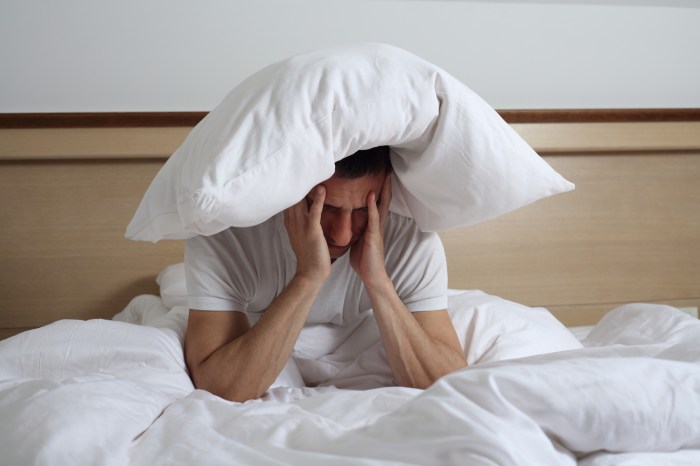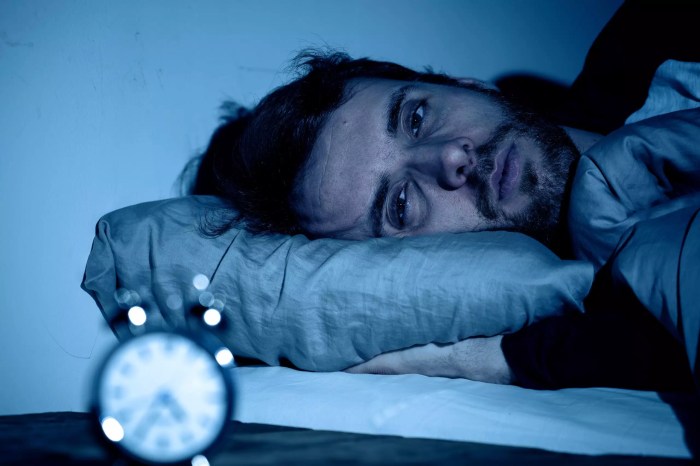Be free of anxiety at night crossword: Nighttime anxiety is a common problem that can significantly impact your sleep quality and overall well-being. This article explores the causes, consequences, and effective strategies for managing nighttime anxiety, empowering you to reclaim restful nights and a peaceful mind.
The content of the second paragraph that provides descriptive and clear information about the topic
Causes of Nighttime Anxiety

Nighttime anxiety is a common experience characterized by excessive worry and fear during the evening or nighttime hours. This can significantly impact sleep quality and overall well-being. Understanding the underlying causes of nighttime anxiety is crucial for developing effective management strategies.
The etiology of nighttime anxiety is multifactorial, involving both physiological and psychological factors. Stressful life events, sleep deprivation, and underlying mental health conditions can all contribute to its development.
Physiological Factors
Physiological factors play a significant role in the development of nighttime anxiety. The body’s natural sleep-wake cycle, known as the circadian rhythm, is regulated by the hormone melatonin. When melatonin levels are low, it can lead to difficulty falling or staying asleep, which can exacerbate anxiety.
Additionally, certain medical conditions, such as thyroid problems, heart disease, and respiratory issues, can disrupt sleep and contribute to nighttime anxiety.
Psychological Factors, Be free of anxiety at night crossword
Psychological factors are also significant contributors to nighttime anxiety. Stressful life events, such as work or financial problems, can trigger anxiety and make it difficult to relax at night. Sleep deprivation can worsen stress and anxiety levels, creating a vicious cycle.
Underlying mental health conditions, such as generalized anxiety disorder (GAD) and post-traumatic stress disorder (PTSD), can also lead to nighttime anxiety. These conditions are characterized by persistent worry and fear, which can intensify at night when the individual is alone with their thoughts.
Impact of Nighttime Anxiety

Nighttime anxiety can have a profound impact on an individual’s well-being. Its consequences extend beyond sleep disturbances to affect overall health and daily functioning.
Chronic anxiety, whether experienced at night or during the day, is associated with a range of physical and mental health risks. These include an increased likelihood of developing cardiovascular disease, gastrointestinal problems, and depression.
Impact on Sleep Quality
Nighttime anxiety significantly impairs sleep quality. Individuals with anxiety may experience difficulty falling or staying asleep, frequent awakenings, and unrefreshing sleep. This can lead to excessive daytime sleepiness, impaired cognitive function, and reduced productivity.
Impact on Overall Well-being
Nighttime anxiety can also have a detrimental impact on overall well-being. It can lead to feelings of irritability, fatigue, and difficulty concentrating. Individuals may also experience a decline in mood and an increased risk of developing anxiety and depressive disorders.
Impact on Daily Functioning
The negative effects of nighttime anxiety can extend to an individual’s daily functioning. Sleep deprivation and impaired cognitive function can affect performance at work or school, as well as the ability to engage in social activities and relationships.
Strategies for Managing Nighttime Anxiety
Nighttime anxiety can be a debilitating condition that can make it difficult to fall asleep and stay asleep. Fortunately, there are a number of evidence-based strategies that can be used to reduce nighttime anxiety and improve sleep quality.
One of the most effective strategies for managing nighttime anxiety is relaxation exercises. Relaxation exercises can help to reduce muscle tension, slow the heart rate, and calm the mind. There are a number of different relaxation exercises that can be used, including deep breathing, progressive muscle relaxation, and meditation.
Cognitive-behavioral therapy (CBT) is another effective strategy for managing nighttime anxiety. CBT is a type of therapy that helps people to identify and change negative thoughts and behaviors that contribute to anxiety. CBT can be used to teach people how to challenge negative thoughts, develop more positive coping mechanisms, and improve sleep hygiene.
Medication may also be an option for managing nighttime anxiety. There are a number of different medications that can be used to treat anxiety, including benzodiazepines, antidepressants, and antipsychotics. Medication can be effective in reducing anxiety and improving sleep quality, but it is important to note that it can also have side effects.
It is important to talk to a doctor about the risks and benefits of medication before starting treatment.
Benefits and Limitations of Each Strategy
Each of the strategies discussed above has its own benefits and limitations. Relaxation exercises are generally safe and easy to learn, but they may not be effective for everyone. CBT is an effective treatment for nighttime anxiety, but it can be time-consuming and expensive.
Medication can be effective in reducing anxiety and improving sleep quality, but it can also have side effects. It is important to talk to a doctor about the risks and benefits of each strategy before starting treatment.
Lifestyle Modifications for Reducing Nighttime Anxiety

Making certain lifestyle adjustments can significantly improve sleep quality and alleviate nighttime anxiety. Establishing a regular sleep schedule, avoiding caffeine and alcohol consumption before bed, and engaging in regular exercise are crucial steps towards reducing nighttime anxiety.
Establishing a Regular Sleep Schedule
Maintaining a consistent sleep-wake cycle, even on weekends, helps regulate the body’s natural sleep-wake rhythm. Aim to go to bed and wake up at approximately the same time each day, creating a predictable pattern that signals the body when it’s time to sleep or be awake.
Avoiding Caffeine and Alcohol Before Bed
Caffeine and alcohol are known to interfere with sleep. Caffeine can stimulate the nervous system, making it difficult to fall asleep, while alcohol can disrupt sleep patterns and lead to fragmented sleep.
Engaging in Regular Exercise
Regular physical activity can help reduce stress and improve sleep quality. However, it’s important to avoid exercising too close to bedtime, as this can have a stimulating effect and make it harder to fall asleep.
When to Seek Professional Help
If nighttime anxiety persists despite self-help strategies and lifestyle modifications, seeking professional help is crucial. Signs and symptoms that warrant professional intervention include:
- Persistent anxiety that interferes with daily functioning, including sleep, work, and relationships.
- Excessive worry and rumination that cannot be controlled.
- Physical symptoms of anxiety, such as rapid heart rate, sweating, and muscle tension.
- Avoidance of situations or activities that trigger anxiety.
- Difficulty concentrating or making decisions.
- Hopelessness or thoughts of self-harm.
Types of Therapy and Medication
Professional help for nighttime anxiety may involve various forms of therapy and medication:
Therapy
- Cognitive Behavioral Therapy (CBT): Focuses on identifying and changing negative thought patterns and behaviors that contribute to anxiety.
- Exposure and Response Prevention (ERP): Gradually exposes individuals to feared situations or objects while teaching coping mechanisms.
- Mindfulness-Based Therapy: Cultivates present-moment awareness and acceptance, reducing stress and anxiety.
Medication
- Selective Serotonin Reuptake Inhibitors (SSRIs): Antidepressants that increase serotonin levels, improving mood and reducing anxiety.
- Benzodiazepines: Fast-acting sedatives that provide temporary relief from anxiety but can be habit-forming.
- Buspirone: A non-benzodiazepine medication that reduces anxiety without causing sedation.
Popular Questions: Be Free Of Anxiety At Night Crossword
What are the common causes of nighttime anxiety?
Nighttime anxiety can be triggered by various factors, including stress, sleep deprivation, caffeine or alcohol consumption, and underlying mental health conditions such as generalized anxiety disorder or panic disorder.
How does nighttime anxiety affect my health?
Chronic nighttime anxiety can lead to a range of health problems, including insomnia, fatigue, impaired cognitive function, and increased risk of cardiovascular disease and depression.
What are some effective strategies for managing nighttime anxiety?
Effective strategies for managing nighttime anxiety include relaxation techniques (e.g., deep breathing, meditation), cognitive-behavioral therapy, and medication. Establishing a regular sleep schedule, avoiding caffeine and alcohol before bed, and engaging in regular exercise can also be beneficial.